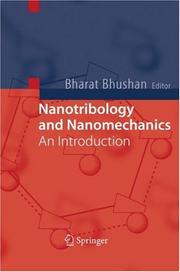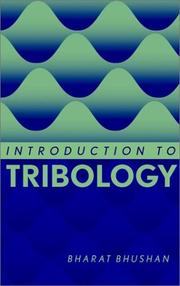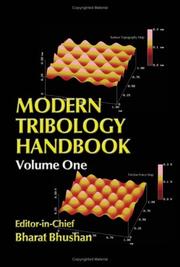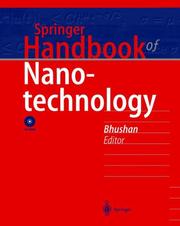| Listing 1 - 10 of 142 | << page >> |
Sort by
|

ISBN: 3540282483 3540242678 Year: 2005 Publisher: Berlin, Heidelberg : Springer Berlin Heidelberg : Imprint: Springer,
Abstract | Keywords | Export | Availability | Bookmark
 Loading...
Loading...Choose an application
- Reference Manager
- EndNote
- RefWorks (Direct export to RefWorks)
The recent emergence and proliferation of proximal probes, e.g. SPM and AFM, and computational techniques for simulating tip-surface interactions has enabled the systematic investigation of interfacial problems on ever smaller scales, as well as created means for modifying and manipulating nanostructures. In short, they have led to the appearance of the new, interdisciplinary fields of micro/nanotribology and micro/nanomechanics. This volume serves as a timely, practical introduction to the principles of nanotribology and nanomechanics and applications to magnetic storage systems and MEMS/NEMS. Assuming some familiarity with macrotribology/mechanics, the book comprises chapters by internationally recognized experts, who integrate knowledge of the field from the mechanics and materials-science perspectives. They cover key measurement techniques, their applications, and theoretical modelling of interfaces, each beginning their contributions with macro- and progressing to microconcepts. After reviewing the fundamental experimental and theoretical aspects in the first part, Nanotribology and Nanomechanics then treats applications. Three groups of readers are likely to find this text valuable: graduate students, research workers, and practicing engineers. It can serve as the basis for a comprehensive, one- or two-semester course in scanning probe microscopy; applied scanning probe techniques; or nanotribology/nanomechanics/nanotechnology, in departments such as mechanical engineering, materials science, and applied physics. With a Foreword by Physics Nobel Laureate Gerd Binnig Dr. Bharat Bhushan is an Ohio Eminent Scholar and The Howard D. Winbigler Professor in the Department of Mechanical Engineering, Graduate Research Faculty Advisor in the Department of Materials Science and Engineering, and the Director of the Nanotribology Laboratory for Information Storage & MEMS/NEMS (NLIM) at the Ohio State University, Columbus, Ohio. He is an internationally recognized expert of tribology and mechanics on the macro- to nanoscales, and is one of the most prolific authors. He is considered by some a pioneer of the tribology and mechanics of magnetic storage devices and a leading researcher in the fields of nanotribology and nanomechanics using scanning probe microscopy and applications to micro/nanotechnology. He is the recipient of various international fellowships including the Alexander von Humboldt Research Prize for Senior Scientists, Max Planck Foundation Research Award for Outstanding Foreign Scientists, and the Fulbright Senior Scholar Award.
Tribology. --- Nanotechnology. --- Molecular technology --- Nanoscale technology --- High technology --- Friction --- Surfaces (Technology) --- Chemistry, inorganic. --- Surfaces (Physics). --- Mechanics. --- Mechanics, Applied. --- Mechanical engineering. --- Electronics. --- Tribology, Corrosion and Coatings. --- Surfaces and Interfaces, Thin Films. --- Solid Mechanics. --- Mechanical Engineering. --- Electronics and Microelectronics, Instrumentation. --- Electrical engineering --- Physical sciences --- Engineering, Mechanical --- Engineering --- Machinery --- Steam engineering --- Applied mechanics --- Engineering mathematics --- Classical mechanics --- Newtonian mechanics --- Physics --- Dynamics --- Quantum theory --- Surface chemistry --- Inorganic chemistry --- Chemistry --- Inorganic compounds --- Corrosion and anti-corrosives. --- Coatings. --- Materials—Surfaces. --- Thin films. --- Microelectronics. --- Microminiature electronic equipment --- Microminiaturization (Electronics) --- Electronics --- Microtechnology --- Semiconductors --- Miniature electronic equipment --- Films, Thin --- Solid film --- Solid state electronics --- Solids --- Coatings --- Thick films --- Surface coatings --- Materials --- Coating processes --- Thin films --- Anti-corrosive paint --- Atmospheric corrosion --- Metal corrosion --- Metals --- Rust --- Rustless coatings --- Chemical inhibitors --- Chemistry, Technical --- Fouling --- Weathering --- Paint --- Protective coatings --- Waterproofing --- Corrosion --- Deterioration --- Surfaces
Book
ISBN: 1281862312 9786611862312 3540776087 3540776079 Year: 2008 Publisher: Berlin : Springer,
Abstract | Keywords | Export | Availability | Bookmark
 Loading...
Loading...Choose an application
- Reference Manager
- EndNote
- RefWorks (Direct export to RefWorks)
This volume serves as a timely, practical introduction to the principles of nanotribology and nanomechanics and applications to magnetic storage systems, MEMS/NEMS and BioMEMS/bioNEMS. Assuming some familiarity with macrotribology/mechanics, the book comprises chapters by internationally recognized experts, who integrate knowledge of the field from the mechanics and materials-science perspectives. They cover key measurement techniques, their applications, and theoretical modelling of interfaces, each beginning their contributions with macro- and progressing to microconcepts. After reviewing the fundamental experimental and theoretical aspects in the first part, Nanotribology and Nanomechanics then treats applications. Three groups of readers are likely to find this text valuable: graduate students, research workers, and practicing engineers. It can serve as the basis for a comprehensive, one- or two-semester course in scanning probe microscopy; applied scanning probe techniques; or nanotribology/nanomechanics/nanotechnology, in departments such as mechanical engineering, materials science, and applied physics. This second, revised edition is substantially enlarged by three new chapters: One new chapter introduces to the theory, physics and characterization of the Lotus-Effect. Other new chapters discuss the attaching properties of hairs as realized at gecko feet and present a comprehensive review of structural, mechanical, and tribological properties of various hair and skin as a function of ethnicity, damage, conditioning treatment, and various environments. With a Foreword by Physics Nobel Laureate Gerd Binnig Dr. Bharat Bhushan is an Ohio Eminent Scholar and The Howard D. Winbigler Professor in the Department of Mechanical Engineering, Graduate Research Faculty Advisor in the Department of Materials Science and Engineering, and the Director of the Nanotribology Laboratory for Information Storage & MEMS/NEMS (NLIM) at the Ohio State University, Columbus, Ohio. He is an internationally recognized expert of tribology and mechanics on the macro- to nanoscales, and is one of the most prolific authors. He is considered by some a pioneer of the tribology and mechanics of magnetic storage devices and a leading researcher in the fields of nanotribology and nanomechanics using scanning probe microscopy and applications to micro/nanotechnology. He is the recipient of various international fellowships including the Alexander von Humboldt Research Prize for Senior Scientists, Max Planck Foundation Research Award for Outstanding Foreign Scientists, and the Fulbright Senior Scholar Award.
Tribology. --- Nanotechnology. --- Molecular technology --- Nanoscale technology --- High technology --- Friction --- Surfaces (Technology) --- Chemistry, inorganic. --- Engineering. --- Surfaces (Physics). --- Mechanics. --- Mechanics, Applied. --- Mechanical engineering. --- Tribology, Corrosion and Coatings. --- Nanotechnology and Microengineering. --- Surfaces and Interfaces, Thin Films. --- Solid Mechanics. --- Mechanical Engineering. --- Engineering, Mechanical --- Engineering --- Machinery --- Steam engineering --- Applied mechanics --- Engineering mathematics --- Classical mechanics --- Newtonian mechanics --- Physics --- Dynamics --- Quantum theory --- Surface chemistry --- Construction --- Industrial arts --- Technology --- Inorganic chemistry --- Chemistry --- Inorganic compounds --- Corrosion and anti-corrosives. --- Coatings. --- Materials—Surfaces. --- Thin films. --- Films, Thin --- Solid film --- Solid state electronics --- Solids --- Coatings --- Thick films --- Surface coatings --- Materials --- Coating processes --- Thin films --- Anti-corrosive paint --- Atmospheric corrosion --- Metal corrosion --- Metals --- Rust --- Rustless coatings --- Chemical inhibitors --- Chemistry, Technical --- Fouling --- Weathering --- Paint --- Protective coatings --- Waterproofing --- Corrosion --- Deterioration --- Surfaces

ISBN: 0471158933 Year: 2002 Publisher: New York (N.Y.) : Wiley,
Abstract | Keywords | Export | Availability | Bookmark
 Loading...
Loading...Choose an application
- Reference Manager
- EndNote
- RefWorks (Direct export to RefWorks)
Machine elements --- mechanical engineering --- Tribology. --- Tribology

ISBN: 0849384036 9780849384035 9780849377877 Year: 2001 Publisher: Boca Raton, FL : CRC Press,
Abstract | Keywords | Export | Availability | Bookmark
 Loading...
Loading...Choose an application
- Reference Manager
- EndNote
- RefWorks (Direct export to RefWorks)
Tribology --- Tribologie (Technologie) --- Handbooks, manuals, etc. --- Guides, manuels, etc. --- Friction --- Surfaces (Technology) --- Tribology - Handbooks, manuals, etc.

ISBN: 3540012184 354029838X 9786610716586 1280716584 1591248310 3540343660 9783540012184 Year: 2004 Publisher: Berlin: Springer,
Abstract | Keywords | Export | Availability | Bookmark
 Loading...
Loading...Choose an application
- Reference Manager
- EndNote
- RefWorks (Direct export to RefWorks)
Since 2004 the Springer Handbook of Nanotechnology has established itself as the definitive reference in the Nanoscience field. It integrates the knowledge from nanofabrication, nanomechanics, materials science, and reliability engineering in just one volume. Reflecting further developments, the new edition has grown from six to eight parts and from 38 to 58 chapters. Existing chapters have been thoroughly updated and new material has been added to cover developing fields such as bionanotechnology, nanorobotics, and NEMS/MEMS reliability. This classic reference book addresses mechanical and electrical engineers, materials scientists, physicists and chemists who work either in the nano area or in a field that is or will be influenced by this new key technology. From the reviews of the first edition: "The strong point is its focus on many of the practical aspects of nanotechnology... Anyone working in or learning about the field of nanotechnology would find this an excellent working handbook.’’ IEEE Electrical Insulation Magazine "Outstandingly succeeds in its aim… It really is a magnificent volume and every scientific library and nanotechnology group should have a copy." Materials World "The integrity and authoritativeness… is guaranteed by an experienced editor and an international team of authors which have well summarized in their chapters information on fundamentals and applications." Polymer News Key Topics Nanostructures Nanomechanics NEMS /MEMS BioNEMS/BioMEMS Micro/Nanofabrication Micro/Nanodevice Reliability Scanning Probe and Force Microscopies Nanotribology and Nanorheology Nanorobotics Molecular Technology Bionanotechnology Therapeutic Nanodevices Industrial Applications Social and Ethical Aspects Features Covers basic concepts, theory, materials, properties, and fabrication. Contains over 1500 two-color illustrations Numerous comprehensive materials data tables. Features exhaustive references to approved data. A detailed index and fully searchable CD-ROM guarantee quick access to data. .
Nanotechnology --- 621.7-187.4 --- Precisiemechanica --- Electronic books. -- local. --- High technology. --- Nanotechnology -- Handbooks, manuals, etc. --- Engineering & Applied Sciences --- Technology - General --- Molecular technology --- Nanoscale technology --- High technology --- Nanotechnology. --- Chemistry, inorganic. --- Mechanics. --- Mechanics, Applied. --- Electronics. --- Tribology, Corrosion and Coatings. --- Solid Mechanics. --- Electronics and Microelectronics, Instrumentation. --- Electrical engineering --- Physical sciences --- Applied mechanics --- Engineering, Mechanical --- Engineering mathematics --- Classical mechanics --- Newtonian mechanics --- Physics --- Dynamics --- Quantum theory --- Inorganic chemistry --- Chemistry --- Inorganic compounds --- Tribology. --- Corrosion and anti-corrosives. --- Coatings. --- Microelectronics. --- Surface coatings --- Materials --- Surfaces (Technology) --- Coating processes --- Thin films --- Friction --- Anti-corrosive paint --- Atmospheric corrosion --- Metal corrosion --- Metals --- Rust --- Rustless coatings --- Chemical inhibitors --- Chemistry, Technical --- Fouling --- Weathering --- Paint --- Protective coatings --- Waterproofing --- Microminiature electronic equipment --- Microminiaturization (Electronics) --- Electronics --- Microtechnology --- Semiconductors --- Miniature electronic equipment --- Corrosion --- Deterioration --- Surfaces --- Nanotechnology - Handbooks, manuals, etc.
Book
ISBN: 3642442676 3642254071 9786613712035 364225408X 1280861347 Year: 2012 Publisher: Heidelberg ; New York : Springer,
Abstract | Keywords | Export | Availability | Bookmark
 Loading...
Loading...Choose an application
- Reference Manager
- EndNote
- RefWorks (Direct export to RefWorks)
This book presents an overview of the general field of biomimetics - lessons from nature. It presents various examples of biomimetics, including roughness-induced superomniphobic surfaces which provide functionality of commercial interest. The major focus in the book is on lotus effect, rose petal effect, shark skin effect, and gecko adhesion. For each example, the book first presents characterization of an object to understand how a natural object provides functionality, followed by modeling and then fabrication of structures in the lab using nature’s route to verify one’s understanding of nature and provide guidance for development of optimum structures. Once it is understood how nature does it, examples of fabrication of optimum structures using smart materials and fabrication techniques, are presented. Examples of nature inspired objects are also presented throughout.
Biomimetic materials. --- Biology --- Health & Biological Sciences --- Biophysics --- Biomimetics --- Biomimicry. --- Biotechnology. --- Bio-inspired engineering --- Physics. --- Surfaces (Physics). --- Interfaces (Physical sciences). --- Thin films. --- Biophysics. --- Biological physics. --- Biomedical engineering. --- Nanotechnology. --- Tribology. --- Corrosion and anti-corrosives. --- Coatings. --- Biophysics and Biological Physics. --- Surface and Interface Science, Thin Films. --- Tribology, Corrosion and Coatings. --- Biomedical Engineering. --- Bionics --- Chemistry, inorganic. --- Biological and Medical Physics, Biophysics. --- Biomedical Engineering and Bioengineering. --- Clinical engineering --- Medical engineering --- Bioengineering --- Engineering --- Medicine --- Inorganic chemistry --- Chemistry --- Inorganic compounds --- Molecular technology --- Nanoscale technology --- High technology --- Surface chemistry --- Surfaces (Physics) --- Films, Thin --- Solid film --- Solid state electronics --- Solids --- Surfaces (Technology) --- Coatings --- Thick films --- Surface coatings --- Materials --- Coating processes --- Thin films --- Anti-corrosive paint --- Atmospheric corrosion --- Metal corrosion --- Metals --- Rust --- Rustless coatings --- Chemical inhibitors --- Chemistry, Technical --- Fouling --- Weathering --- Paint --- Protective coatings --- Waterproofing --- Friction --- Physics --- Biological physics --- Medical sciences --- Corrosion --- Deterioration --- Surfaces
Book
ISBN: 3642025242 3642025250 Year: 2010 Publisher: New York : Springer,
Abstract | Keywords | Export | Availability | Bookmark
 Loading...
Loading...Choose an application
- Reference Manager
- EndNote
- RefWorks (Direct export to RefWorks)
Since 2004 and with the 2nd edition in 2006, the Springer Handbook of Nanotechnology has established itself as the definitive reference in the nanoscience and nanotechnology area. It integrates the knowledge from nanofabrication, nanodevices, nanomechanics, Nanotribology, materials science, and reliability engineering in just one volume. Beside the presentation of nanostructures, micro/nanofabrication, and micro/nanodevices, special emphasis is on scanning probe microscopy, nanotribology and nanomechanics, molecularly thick films, industrial applications and microdevice reliability, and on social aspects. In its 3rd edition, the book grew from 8 to 9 parts now including a part with chapters on biomimetics. More information is added to such fields as bionanotechnology, nanorobotics, and (bio)MEMS/NEMS, bio/nanotribology and bio/nanomechanics. The book is organized by an experienced editor with a universal knowledge and written by an international team of over 150 distinguished experts. It addresses mechanical and electrical engineers, materials scientists, physicists and chemists who work either in the nano area or in a field that is or will be influenced by this new key technology. From the reviews "The strong point is its focus on many of the practical aspects of nanotechnology... Anyone working in or learning about the field of nanotechnology would find this and excellent working handbook." IEEE Electrical Insulation Magazine "Outstandingly succeeds in its aim … . It really is a magnificent volume and every scientific library and nanotechnology group should have a copy." Materials World "The integrity and authoritativeness… is guaranteed by an experienced editor and an international team of authors which have well summarized in their chapters information on fundamentals and applications." Polymer News Key Topics Nanostructures and Nanomaterials Micro/Nanofabrication NEMS /MEMS − BioNEMS/BioMEMS Micro/Nanodevice Reliability Scanning Probe and Force Microscopies Nanotribology and Nanorheology Nanorobotics Biomimetics Industrial Applications Social and Ethical Aspects Features Covers basic concepts, materials, properties, and fabrication. Contains over 1500 two-color illustrations. Numerous comprehensive tables. Features exhaustive references to approved data. DVD contains chapters of the second edition. Fully searchable DVD-ROM for quick access to data.
Chemistry, inorganic. --- Electronics. --- Engineering. --- Materials. --- Microreactors. --- Nanotechnology --- Engineering & Applied Sciences --- Technology - General --- Molecular technology --- Nanoscale technology --- Biotechnology. --- Surfaces (Physics). --- Interfaces (Physical sciences). --- Thin films. --- Continuum mechanics. --- Nanotechnology. --- Microelectronics. --- Tribology. --- Corrosion and anti-corrosives. --- Coatings. --- Nanotechnology and Microengineering. --- Microengineering. --- Surface and Interface Science, Thin Films. --- Tribology, Corrosion and Coatings. --- Continuum Mechanics and Mechanics of Materials. --- Electronics and Microelectronics, Instrumentation. --- High technology --- Mechanics. --- Mechanics, Applied. --- Solid Mechanics. --- Electrical engineering --- Physical sciences --- Applied mechanics --- Engineering, Mechanical --- Engineering mathematics --- Classical mechanics --- Newtonian mechanics --- Physics --- Dynamics --- Quantum theory --- Inorganic chemistry --- Chemistry --- Inorganic compounds --- Micro-chemical engineering --- Microchannel reactors --- Microfabricated reactors --- Microreaction technology --- Mini-scale reactors --- Nano-scale reactors --- Chemical reactors --- Construction --- Industrial arts --- Technology --- Microminiature electronic equipment --- Microminiaturization (Electronics) --- Electronics --- Microtechnology --- Semiconductors --- Miniature electronic equipment --- Surface coatings --- Materials --- Surfaces (Technology) --- Coating processes --- Thin films --- Anti-corrosive paint --- Atmospheric corrosion --- Metal corrosion --- Metals --- Rust --- Rustless coatings --- Chemical inhibitors --- Chemistry, Technical --- Fouling --- Weathering --- Paint --- Protective coatings --- Waterproofing --- Friction --- Films, Thin --- Solid film --- Solid state electronics --- Solids --- Coatings --- Thick films --- Surface chemistry --- Surfaces (Physics) --- Chemical engineering --- Genetic engineering --- Corrosion --- Deterioration --- Surfaces
Book
ISBN: 9048197503 9048197511 1784026921 904819752X Year: 2012 Publisher: Dordrecht ; New York : Springer,
Abstract | Keywords | Export | Availability | Bookmark
 Loading...
Loading...Choose an application
- Reference Manager
- EndNote
- RefWorks (Direct export to RefWorks)
The Encyclopedia of Nanotechnology provides a comprehensive and multi-disciplinary reference to the many fields relevant to the general field of nanotechnology. It aims to be a comprehensive and genuinely international reference work and will be aimed at graduate students, researchers, and practitioners. The Encyclopedia of Nanotechnology introduces a large number of terms, devices and processes which are related to the multi-disciplinary field of Nanotechnology. For each entry in this 4 volume set a 4-10 page description is provided by an expert in the field. Contributions are made by experts from the US, Europe and Asia, making this a comprehensive and truly international Reference Work. The authors are typically from academia, however one quarter of all entries were written by persons from industry. Topics covered in the Reference Work include: - Nano- Microfabrication Processes and Materials for Fabrication - Nanoscale Measurement Techniques <- Nanostructures - Nanomaterials - Nanomechanics - Molecular Modeling and Its Role in Advancing Nanotechnology - MEMS/NEMS - Microfluidics and Nanofluidics - Biomedical Engineering and Biodevices - Bio/Nanotechnology and Nanomedicine - Bio/Nanotechnology for cellular engineering - Drug Delivery – Technology and Applications - Assembly - Organic Electronics - Nano-optical Devices - Micro/nano Integration - Materials, Coatings and Surface Treatments for Nanotribology - Micro/NanoReliability – thermal, mechanical etc. - Biomimetics.
Engineering & Applied Sciences --- Chemical & Materials Engineering --- Materials Science --- Technology - General --- Nanotechnology --- Technology --- Molecular technology --- Nanoscale technology --- Materials science. --- Nanochemistry. --- Nanoscale science. --- Nanoscience. --- Nanostructures. --- Nanotechnology. --- Materials Science. --- Nanotechnology and Microengineering. --- Nanoscale Science and Technology. --- High technology --- Engineering. --- Nanoscale chemistry --- Chemistry, Analytic --- Nanoscience --- Construction --- Industrial arts --- Analytical chemistry --- Physics --- Nano science --- Nanoscale science --- Nanosciences --- Science --- Microtechnology. --- Microelectromechanical systems. --- Microsystems and MEMS. --- Nanophysics. --- MEMS (Microelectromechanical systems) --- Micro-electro-mechanical systems --- Micro-machinery --- Microelectromechanical devices --- Micromachinery --- Micromachines --- Micromechanical devices --- Micromechanical systems --- Electromechanical devices --- Microtechnology --- Mechatronics --- Micro-technology --- Microtechnologies
Book
ISBN: 3319282824 3319282840 Year: 2016 Publisher: Cham : Springer International Publishing : Imprint: Springer,
Abstract | Keywords | Export | Availability | Bookmark
 Loading...
Loading...Choose an application
- Reference Manager
- EndNote
- RefWorks (Direct export to RefWorks)
This revised, updated and expanded new edition presents an overview of biomimetics and biologically inspired structured surfaces. It deals with various examples of biomimetics which include surfaces with roughness-induced superomniphobicity, self-cleaning, antifouling, and controlled adhesion. The focus in the book is on the Lotus Effect, Salvinia Effect, Rose Petal Effect, Oleophobic/philic Surfaces, Shark Skin Effect, and Gecko Adhesion. This new edition also contains new chapters on the butterfly wing effect, bio- and inorganic fouling and structure and Properties of Nacre and structural coloration.
Biophysics --- Biology --- Health & Biological Sciences --- Biomimetics. --- Biomimetics --- Biotechnology. --- Biomimicry --- Chemicals --- Nanotechnology. --- Chemistry, inorganic. --- Surfaces (Physics). --- Biological and Medical Physics, Biophysics. --- Surface and Interface Science, Thin Films. --- Tribology, Corrosion and Coatings. --- Surfaces and Interfaces, Thin Films. --- Physics --- Surface chemistry --- Surfaces (Technology) --- Inorganic chemistry --- Chemistry --- Inorganic compounds --- Molecular technology --- Nanoscale technology --- High technology --- Biophysics. --- Biological physics. --- Interfaces (Physical sciences). --- Thin films. --- Tribology. --- Corrosion and anti-corrosives. --- Coatings. --- Materials—Surfaces. --- Surface coatings --- Materials --- Coating processes --- Thin films --- Anti-corrosive paint --- Atmospheric corrosion --- Metal corrosion --- Metals --- Rust --- Rustless coatings --- Chemical inhibitors --- Chemistry, Technical --- Fouling --- Weathering --- Paint --- Protective coatings --- Waterproofing --- Friction --- Films, Thin --- Solid film --- Solid state electronics --- Solids --- Coatings --- Thick films --- Surfaces (Physics) --- Biological physics --- Medical sciences --- Corrosion --- Deterioration --- Surfaces

ISBN: 0471594075 Year: 1999 Publisher: New York, NY : John Wiley,
Abstract | Keywords | Export | Availability | Bookmark
 Loading...
Loading...Choose an application
- Reference Manager
- EndNote
- RefWorks (Direct export to RefWorks)
Tribology. --- Tribology
| Listing 1 - 10 of 142 | << page >> |
Sort by
|

 Search
Search Feedback
Feedback About UniCat
About UniCat  Help
Help News
News